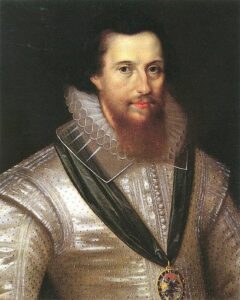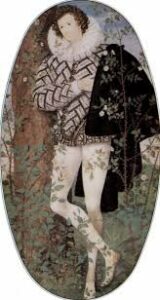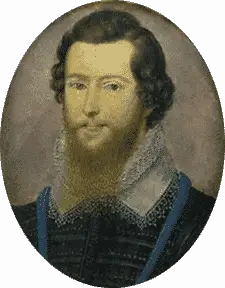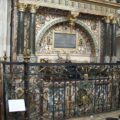
Robert Devereux was born on the 19th November 1566 (some say 10th November 1565) at Netherwood, Herefordshire and was the son of Walter Devereux, 1st Earl of Essex, and his wife Lettice Knollys. His mother, Lettice, was the granddaughter of Mary Boleyn (sister of Anne Boleyn), so Robert Devereux was related to Elizabeth I and was her first cousin twice removed ( I think!). After his father’s death in 1576, William Cecil, Lord Burghley, was made his guardian and then in 1578 his mother married his godfather, Robert Dudley, Earl of Leicester.
Robert Devereux, “the darling of Elizabeth’s old age”
Essex first caught the Queen’s attention in 1584 when his stepfather brought him to court and his “goodly person, urbanity and innate courtesy won him the hearts of both Queen and people” (quoted from Alison Weir’s “Elizabeth, the Queen”) and on his return to court, after successful military service in the Netherlands with his stepfather, Dudley, Essex was appointed Master of the Horse. He was just 21 and the Queen was 53.
Alison Plowden writes that although Robert Devereux is often described as “the darling of Elizabeth’s old age”, having replaced his stepfather in Elizabeth’s affections after Dudley’s death in 1588, “it would probably be more accurate to describe him as one of its greatest headaches”. Although Essex was dashing and charming, Plowden writes of how he was “also spoilt, ambitious and headstrong” and “unlike his stepfather, he never learnt the art of putting his passions in his pocket”. Unlike Dudley, Essex did not know Elizabeth as only a childhood friend or sweetheart can, and he constantly underestimated her and “in his youthful arrogance and impatience he came to see her as a tiresome old woman who, if she could not be cajoled, would have to be bullied – a miscalculation which led inexorably to tragedy.” Alison Weir writes of his “darker side” and how “he could be moody, imperious, petulant and difficult, and, when his temper was roused, he tended to be rashly impulsive”. He sounds like an egotistical young man who had never grown up!
After a successful raid on Cadiz in 1596 during the war with Spain, Essex returned to England as a hero. Plowden writes of how his return to court caused the forming of two factions: the Devereux faction who were seeking military profit and glory and the opposing faction headed by Lord Burghley and his son, Robert Cecil, who were on the side of peace. Although Elizabeth loved flirting with the handsome Essex and doted on him, she sought to keep a balance between the factions and would not always give her favourite what he wanted. This led to Essex sulking like a spoiled child and stormy rows between the him and the Queen. Essex ignored the advice of friends like Francis Bacon, who warned him not to offend Elizabeth by seeking to be overly powerful, because he did not want to settle for “just” being a servant like his stepfather, he wanted more. Wise counsel fell on death ears and Elizabeth’s attempts to tame wild-child Essex failed.

Pride Comes Before a Fall
Ultimately, I think it can be said that it was his pride, his need for recognition and power, that led to his undoing. In 1599, Essex became Lord Lieutenant of Ireland but his campaign against the Irish was unsuccessful. Essex constantly ignored the Queen’s orders, acted contrary to her wishes and became, as Alison Weir describes, “obsessed with fears of what the Cecil faction were doing at home to undermine his influence”. His obsession with power led to him giving up on the Irish situation, making a truce with the Irish rebel leader (against the Queen’s wishes) and returning to England without the Queen’s permission. This amounted to desertion and disobedience, something which Elizabeth could not and would not tolerate. The situation was made worse on the 28th September 1599 by Essex striding into Elizabeth’s bedchamber unannounced and seeing the Queen without her makeup or wig, without her “mask of youth”.
On the 29th September, Essex was interrogated before the Queen’s Council for around 5 hours and the Council concluded that his truce with the Irish rebels was indefensible and that his return to England was a desertion of duty. Essex was then put under house arrest. In June 1600, Essex appeared before a special court and was punished by being deprived of his public office and being confined to his home. However, in August, he was granted his freedom, although his sweet wines monopoly, his one source of income, was not renewed.
He may well have wormed his way back into the Queen’s affections if he had apologised and appealed to the Queen for mercy, after all, she had a soft spot for him and was used to his impulsive behaviour, but Essex made the fatal mistake of trying to enlist the support of the Scottish king, James VI, against Cecil’s faction at court and planning a coup for March 1601, where “once the City and Tower had been secured, Essex would approach the Queen “in such peace as not a dog would wag his tongue at him” and make her summon a Parliament, in which he would have Cecil, Raleigh and their associates impeached and himself named Lord Protector” (Alison Weir). When, on the 7th February, Essex received a message from the Queen that he was to present himself before Council, he decided to move things forward and summoned three hundred followers, telling them that Cecil and Raleigh were planning to assassinate him and that the rising should therefore take place the next day, instead of in March.
On the 8th February 1601, Essex, his supporters and two hundred soldiers gathered at Essex House. Essex then marched into the city crying “For the Queen! For the Queen! The crown of England is sold to the Spaniard! A plot is laid for my life!” but London’s citizens remained indoors instead of joining him on his march. As his supporters deserted him, Essex was forced to give up and return home, where he surrendered after Lord Admiral Nottingham threatened to blow up his house if he did not give himself up.
On the 9th February, Elizabeth I told the French ambassador that the “shameless ingrate, had at last revealed what had long been in his mind”. Her patience had been stretched beyond breaking point and she could no longer excuse her past favourite’s behaviour. On the 13th February the full details of the coup planned by Essex were made public and on the 17th February indictments were laid against Essex and his key supporters, including Henry Wriothesley, 4th Earl of Southampton. Two days later, on the 19th February, Robert Devereux, Earl of Essex, and his friend, Southampton, were tried at Westminster Hall by a jury of their peers. Both men were accused of high treason, found guilty and sentenced to death. Elizabeth I, in her mercy, commuted Southampton’s sentence to life in prison and Essex’s sentence of a traitor’s death to death by beheading. On the 20th February, the Queen signed his death warrant.
On the 25th February 1601, at a little before 8am, Robert Devereux, 2nd Earl of Essex, was brought out to the scaffold on Tower Green. Alison Weir writes of how “he acknowledged, with thankfulness to God, that he was justly spewed out of the realm” and then he continued, saying:-
“My sins are more in number than the hairs on my head. I have bestowed my youth in wantonness, lust and uncleanness; I have been puffed up with pride, vanity and love of this wicked world’s pleasures. For all which, I humbly beseech my Saviour Christ to be a mediator to the eternal Majesty for my pardon, especially for this my last sin, this great, this bloody, this crying, this infectious sin, whereby so many for love of me have been drawn to offend God, to offend their sovereign, to offend the world. I beseech God to forgive it us, and to forgive it me – most wretched of all.”
He then asked God to preserve the Queen’s life “whose death I protest I never meant, nor violence to her person”, asked the crowd to join with him in prayer and asked God to forgive his enemies. Essex then removed his gown and ruff and knelt at the block. He said the Lord’s prayer, forgave the executioner and then repeated the Creed after the clergyman. He rose, took off his doublet to reveal a scarlet waistcoat and readied himself on the block again saying:-
“Lord, be merciful to Thy prostrate servant! Lord into Thy hands I commend my spirit.”
After repeating two verses of Psalm 51, Essex cried out “Executioner, strike home!” and the executioner struck. It took three strokes to sever his head and then the executioner lifted his head shouting “God save the Queen!”
Although Elizabeth I must have grieved over the loss of the man who had brought her so much joy and helped to keep her young, Alison Plowden writes that “she never hesitated over its necessity” and that Essex “had committed two unforgiveable sins. He had set out to turn her own Londoners against her, and he would have touched her sceptre”. His punishment was just and necessary, Essex had to go.
Sources
- “Elizabeth, the Queen” by Alison Weir
- “Elizabeth I” by Alison Plowden








